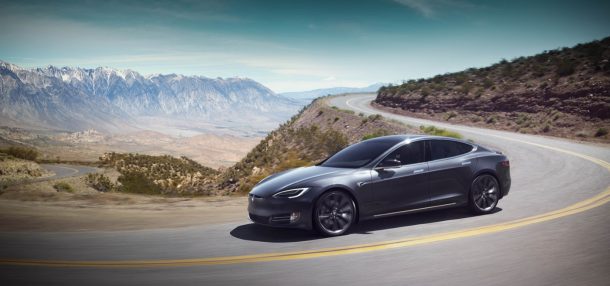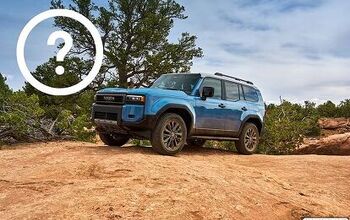Tesla Talks on Track, China Says, Despite Musk's Trade Rant

Earlier this month, Tesla Motors CEO Elon Musk called into question the fairness of China’s automotive trade practice via a handful of tweets to President Donald Trump.
“Do you think the US [and] China should have equal [and] fair rules for cars? Meaning, same import duties, ownership constraints [and] other factors,” Musk asked. “For example, an American car going to China pays 25 [percent] import duty, but a Chinese car coming to the US only pays 2.5 [percent], a tenfold difference.”
While Trump used Musk’s Twitter outburst as proof of China’s trade imbalance with the United States, the media began to wonder if the Tesla CEO was having an unpleasant time negotiating with the nation. In 2017, the automaker appeared to be on the cusp of a deal to build a factory in Shanghai — allowing it to cut costs within the region by a third. Fortunately for the brand, Musk’s trade concerns haven’t derailed progress. The Shanghai government has confirmed its talks with Tesla are progressing well.
“Both sides will keep looking thoroughly at plans in China. Currently the details are still under discussion, once anything is confirmed we will announce it as quickly as possible,” Chinese officials said in statement to Reuters. “As Tesla CEO Elon Musk has said openly before, Tesla attaches great importance to its development and plans in China.”
Shanghai expressed the importance of shared electrification goals but made no direct reference to Musk’s issues with China’s trading policies. There’s also no news of which company Tesla will enter into a joint venture with in order to produce cars within the country. China requires foreign automakers to partner with established domestic firms if they want to assemble cars there — a matter, along with the tariffs, Elon Musk doesn’t seem particularly fond of.
“The current rules make things very difficult. It’s like competing in an Olympic race wearing lead shoes,” Musk wrote. “China has already shown a willingness to open their markets and I believe they will do the right thing [in the end].”
[Image: Tesla Motors]

A staunch consumer advocate tracking industry trends and regulation. Before joining TTAC, Matt spent a decade working for marketing and research firms based in NYC. Clients included several of the world’s largest automakers, global tire brands, and aftermarket part suppliers. Dissatisfied with the corporate world and resentful of having to wear suits everyday, he pivoted to writing about cars. Since then, that man has become an ardent supporter of the right-to-repair movement, been interviewed on the auto industry by national radio broadcasts, driven more rental cars than anyone ever should, participated in amateur rallying events, and received the requisite minimum training as sanctioned by the SCCA. Handy with a wrench, Matt grew up surrounded by Detroit auto workers and managed to get a pizza delivery job before he was legally eligible. He later found himself driving box trucks through Manhattan, guaranteeing future sympathy for actual truckers. He continues to conduct research pertaining to the automotive sector as an independent contractor and has since moved back to his native Michigan, closer to where the cars are born. A contrarian, Matt claims to prefer understeer — stating that front and all-wheel drive vehicles cater best to his driving style.
More by Matt Posky
Latest Car Reviews
Read moreLatest Product Reviews
Read moreRecent Comments
- Theflyersfan If this saves (or delays) an expensive carbon brushing off of the valves down the road, I'll take a case. I understand that can be a very expensive bit of scheduled maintenance.
- Zipper69 A Mini should have 2 doors and 4 cylinders and tires the size of dinner plates.All else is puffery.
- Theflyersfan Just in time for the weekend!!! Usual suspects A: All EVs are evil golf carts, spewing nothing but virtue signaling about saving the earth, all the while hacking the limbs off of small kids in Africa, money losing pits of despair that no buyer would ever need and anyone that buys one is a raging moron with no brains and the automakers who make them want to go bankrupt.(Source: all of the comments on every EV article here posted over the years)Usual suspects B: All EVs are powered by unicorns and lollypops with no pollution, drive like dreams, all drivers don't mind stopping for hours on end, eating trays of fast food at every rest stop waiting for charges, save the world by using no gas and batteries are friendly to everyone, bugs included. Everyone should torch their ICE cars now and buy a Tesla or Bolt post haste.(Source: all of the comments on every EV article here posted over the years)Or those in the middle: Maybe one of these days, when the charging infrastructure is better, or there are more options that don't cost as much, one will be considered as part of a rational decision based on driving needs, purchasing costs environmental impact, total cost of ownership, and ease of charging.(Source: many on this site who don't jump on TTAC the split second an EV article appears and lives to trash everyone who is a fan of EVs.)
- The Oracle Some commenters have since passed away when this series got started.
- The Oracle Honda is generally conservative yet persistent, this will work in one form or fashion.


































Comments
Join the conversation
China knows that gutting the US economy is bad business. They should have pivoted to focus on domestic production long ago, but something going on in China has been pushing them towards mutually assured destruction. Not sure how this will play out in the grand scheme, but hopefully China is ready for both of us to prosper, not just the American capitalist class and the Chinese labor bureaucracy.
GM and Ford along with every other Western auto maker has happily been manufacturing vehicles in China for years under the joint venture scheme. Presumably they do it to make money, or they would have left already. 50% of a great fat pile of loot is still a pretty big fat pile. Knowing the proclivities of businessmen, they aren't in the least bit bothered whether China "steals" their "intellectual property", so long as the quarterly reports are good. GM happily exports Chinese Buick Envisions and Cadillacs back to the US with an apparently clear conscience. Geely, who owns Volvo exports the S90 and the S60L worldwide. Making a car isn't rocket science unless you're Tesla struggling away, so precious little is being "lost" anyway. Back in the early '80s Reagan threatened high import duties on Japanese cars. So Honda, Toyota and Nissan built factories in the US. No JV rules, but the US was a highly developed country, unlike the China of 25 years ago. Musk has moaned about the car dealer franchise system in the US which has prevented him opening factory Tesla stores in many places. Those franchised dealer interests have stymied his grand plans and are in no mood to change their version of the gravy train. Now he moans about China's import duties instead of opening up a JV there like everyone else. An EV is about as technological as a bread-slicing machine - electric cars were common well over a hundred years ago, before bread slicers were invented in fact. And China has literally dozens and dozens of local EV companies already. What's to steal from Tesla? Autopilot? That works so well. As for Geely, their new SC factory soon due to be opened was intended to make Volvo S60s for the entire world. But the recent bellicosity with regard to steel and aluminum impfforts have given them pause to reconsider from what I've read, although the connection is tenuous to me. It's likely that Geely has noted BMW has received zero "credit" for making all its X models in the US for the world market (now about to change), and wonders if the investment and effort is worthwhile. A trip to Walmart or a trawl through Amazon shows that China has the world by the short and curlies on plastic garbage cans and clothes and electronics. There's where the real trade imbalance lies, surely?